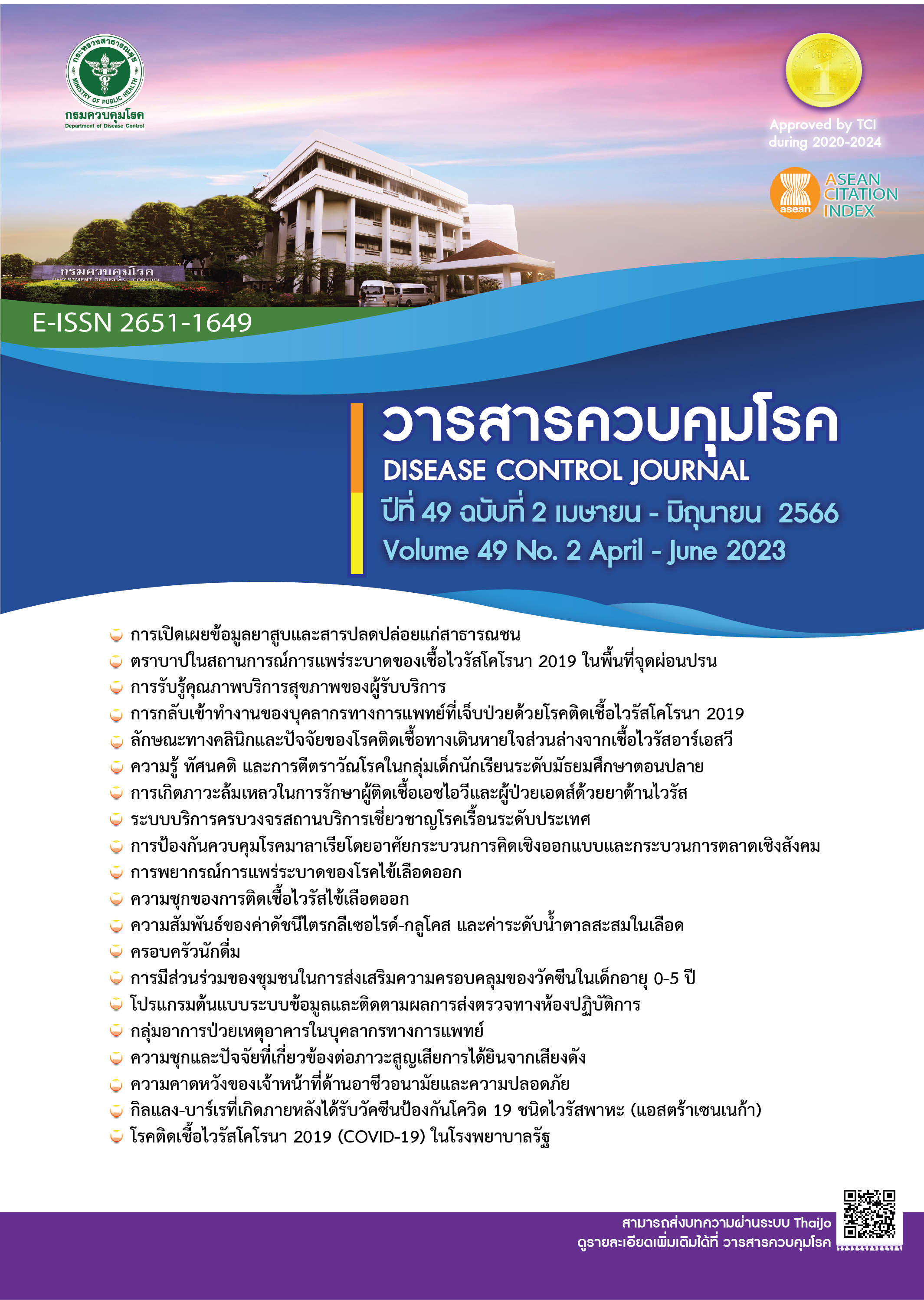An exploration of TB-related knowledge, attitudes, and stigma among senior high school students in Bangkok, Thailand
DOI:
https://doi.org/10.14456/dcj.2023.26Keywords:
tuberculosis, TB knowledge, TB attitudes, TB stigma, high school studentsAbstract
Since the purpose of the study was to explore TB-related knowledge, attitudes, and stigma among senior high school students in Bangkok, a cross-sectional design was implemented. All 630 participants were senior high school students aged 15-19 years old, who were studying in grades 10-12 in Bangkok-based schools under the Office of Basic Education Commission (OBEC). Data were collected using questionnaires consisting of the following four parts including 1) factors related to demographic characteristics, 2) knowledge about pulmonary tuberculosis (TB), 3) attitudes toward pulmonary tuberculosis, and 4) TB stigma. Findings from this study indicated that most of participants (54.3%) had an average score of TB knowledge considered as at a poor level (mean±SD=12.17±2.31), especially knowledge about TB transmission, symptoms of suspected TB, TB treatment, and TB prevention. Regarding attitudes toward TB, most of the participants (74.5%) had an average score at a moderate level (mean±SD=37.06±8.01). However, the participants still needed to improve their attitudes about food consumption and living with TB patients. In the meantime, TB stigma was reported at a high level in 57.1% (mean±SD=11.07±4.50) of the sample population. High school students need to improve their perception of TB stigma, for instance, people who have TB are believed to be dirty and disgusting, making people who have TB embarrassed, people not wanting to stay close to those with TB, people not wanting to play with friend who was sick with TB, and people keeping a social distance from TB patients. The study suggests that effective strategies or interventions should be adopted and implemented with adequate advocacy and social mobilization in schools to fill the gaps related to TB knowledge, transmission, symptoms, prevention and TB treatment, as well as providing the positive attitudes toward the disease to reduce TB stigma and discrimination found among high school students.
Downloads
References
World Health Organization. Global Tuberculosis Report 2020. Geneva: World Health Organization; 2020.
Division of Tuberculosis. National Tuberculosis Control Programme Guideline, Thailand 2021. Bangkok: Division of Tuberculosis; 2021. (in Thai)
Division Control of AIDS TB and STI. Bangkok Annual TB Report 2019. Bangkok: Division Control of AIDS TB and STI; 2020. (in Thai)
Yin X, Yan S, Tong Y, Peng X, Yang T, Lu Z, et al. Status of tuberculosis‐related stigma and associated factors: a cross‐sectional study in central China. Trop Med Int Health. 2018;23(2):199-205.
Goffman E. Notes on the management of spoiled identity. New York: Prentiss-Hall; 1963.
Baral SC, Karki DK, Newell JN. Causes of stigma and discrimination associated with tuberculosis in Nepal: a qualitative study. BMC public health. 2007;7(1):1-10.
National Statistical Office. The Thai Population and Housing Census [internet]. 2021 [cited 2022 Jun 9]. Available from:http://www.nso.go.th.
Debulpaep S, Dreesman A, Dirix V, Toppet V, Wanlin M, Geysens L, et al. Tuberculosis Transmission in a Primary School and a Private Language School. An Estimation of Infectivity. Frontiers in Pediatrics. 2020;8:10.
Zhang S, Li X, Zhang T, Fan Y, Li Y. The experiences of high school students with pulmonary tuberculosis in China: a qualitative study. BMC Infectious Diseases. 2016;16(1):758.
Osonwa KO, Eko JE. Assessment of knowledge, attitude and tuberculosis-related social stigma among school adolescent in a semi-urban town in Cross River State, Nigeria. International Journal of Education and research. 2015;3(2) :81-90.
Daniel WW. Biostatistics: a foundation for analysis in the health sciences. 7th ed. New York: John Wiley and Sons; 1999. p. 606-11.
Van Rie A, Sengupta S, Pungrassami P, Balthip Q, Choonuan S, Kasetjaroen Y, et al. Measuring stigma associated with tuberculosis and HIV/AIDS in southern Thailand: exploratory and confirmatory factor analyses of two new scales. Tropical medicine & international health. 2008;13(1):21-30.
Keanchunbai W. The efficacy of perception program for pulmonary tuberculosis prevention household contacts in Taphaya district at Sakeao Province [Thesis]. Mahasarakham: Mahasarakham University; 2017. 189 p. (in Thai)
Pengpid S, Peltzer K, Puckpinyo A, Tiraphat S, Viripiromgool S, Apidechkul T, et al. Knowledge, attitudes, and practices about tuberculosis and choice of communication channels in Thailand. J Infect Dev Ctries. 2016;10(07):694-703.
Craig G, Meershoek A, Zwerling A, Daftary A, Citro B, Smyth C, et al. TB stigma-measurement guidance. USA: USAID; 2018.
Moya EM, Biswas A, Chavez Baray SM, Martinez O, Lomeli B. Assessment of stigma associated with tuberculosis in Mexico. Public health action. 2014;4(4):226-32.
Obuku EA, Meynell C, Kiboss-Kyeyune J, Blankley S, Atuhairwe C, Nabankema E, et al. Socio-demographic determinants and prevalence of Tuberculosis knowledge in three slum populations of Uganda. BMC public health. 2012;12(1):1-9.
Sharma N, Malhotra R, Taneja D, Saha R, Ingle G. Awareness and perception about tuberculosis in the general population of Delhi. Asia Pacific Journal of Public Health. 2007;19(2):10-5.
Jittimanee SX, Nateniyom S, Kittikraisak W, Burapat C, Akksilp S, Chumpathat N, et al. Social stigma and knowledge of tuberculosis and HIV among patients with both diseases in Thailand. PLoS One. 2009;4(7):e6360.
Dhingra V, Khan S. A sociological study on stigma among TB patients in Delhi. The Indian Journal of Tuberculosis. 2010;57(1):12-8.
Downloads
Published
How to Cite
Issue
Section
License
Copyright (c) 2023 Disease Control Journal

This work is licensed under a Creative Commons Attribution-NonCommercial-NoDerivatives 4.0 International License.
Articles published in the Disease Control Journal are considered as academic work, research or analysis of the personal opinion of the authors, not the opinion of the Thailand Department of Disease Control or editorial team. The authors must be responsible for their articles.






